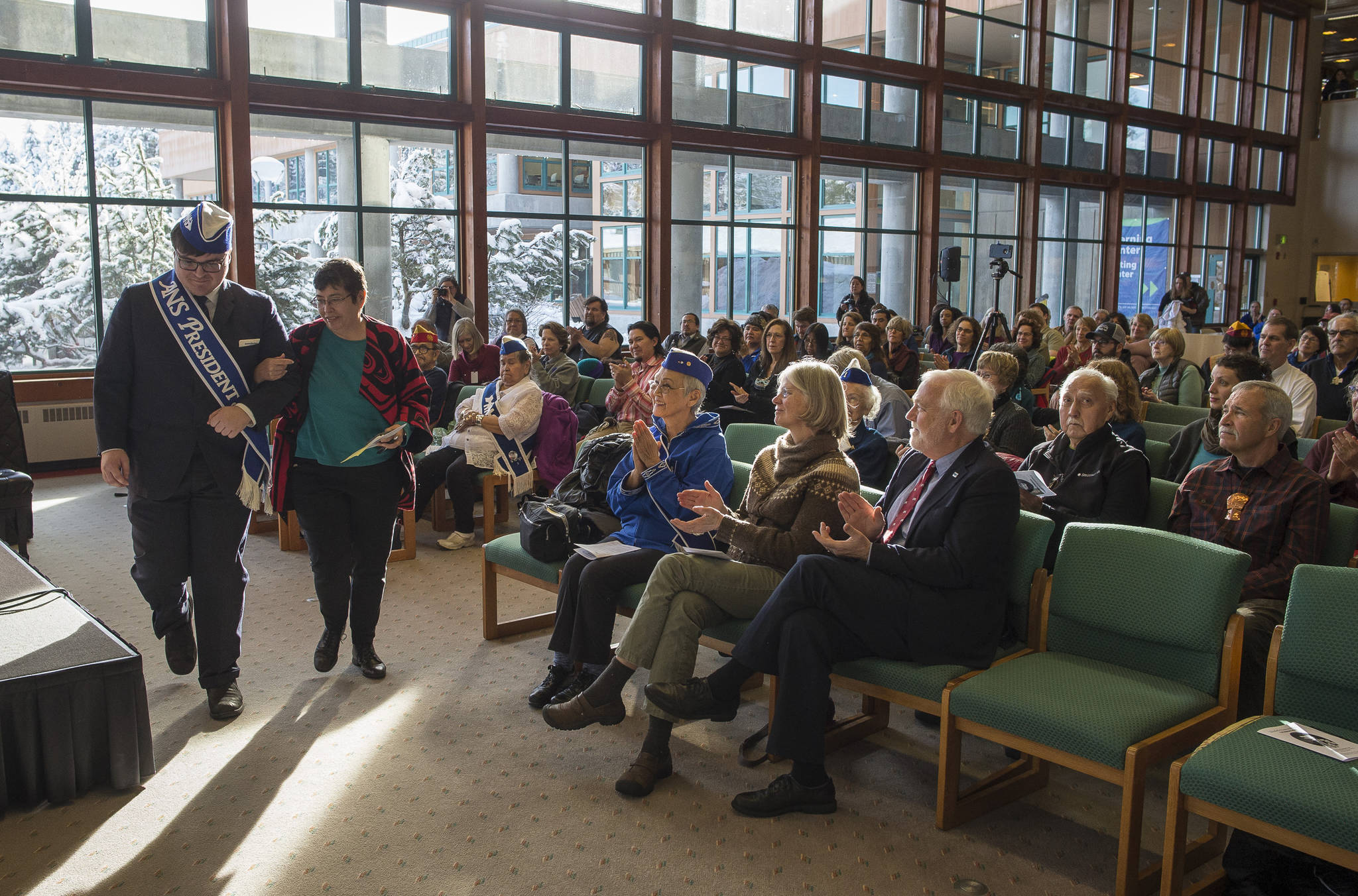Elizabeth Peratrovich’s most famous quote is by now the stuff of legend.
Speaking before the territorial government of Alaska on Feb. 5, 1945, the Alaska Native civil rights leader roused ‘volleys’ of applause from the gallery, as the Daily Alaska Empire, a previous incarnation of the Juneau Empire told it.
Part of that speech included the biting retort for which the figure is now known.
“I would not have expected that I, who am barely out of savagery, would have to remind gentlemen with 5,000 years of recorded civilization behind them, of our Bill of Rights,” she said.
Alaska Native leaders and community members celebrated Peratrovich’s legacy Friday at the University of Alaska Southeast Egan Library. The theme of the celebration was Haa daat has nák, haa léelk‘u hás which translates in English as “our grandparents are standing around us (giving us support).”
Friday’s celebration made it clear that Peratrovich stood on the shoulders of those who came before her, and those who came after, in turn, were only able to make a difference standing on hers.
Living Native leaders were honored with two honorary koogeinaa or sashes. The Alaska Native Sisterhood, camp 2, honored sister Ann Chilton, while ANS Glacier Valley, camp 70, honored longtime sister Anne Fuller.
Elizabeth Peratrovich was a matriarch, Alaska Native Brotherhood Grand Camp President Sasha Soboleff said. Though not many outside the community know it, women are the decision-makers in Tlingit society, he said.
As such Peratrovich is a model on how to be a leader. Soboleff called for tolerance and “simultaneousness” between Alaska Native and non-Native Alaskans.
“The opposite of to tolerate is to be closed-minded. That leads to class-like societies which are unable to coexist,” Soboleff said.
The task of continued toleration will fall to the next generation.
“Elizabeth Peratrovich set the mark long before Martin Luther King Jr. did. Elizabeth and Roy Peratrovich put their necks on the line,” Soboleff said. “Today, these tasks that we have are for you, and for you, and you.”
Keynote speaker Joaqlin Estus is a special projects consultant for KNBA FM, an Alaska Native-owned and operated public radio station serving Anchorage and Southcentral Alaska.
She educated the audience on the history of Alaska Native rights. Early Native rights activists borrowed from the black rights movement in America by focusing their efforts first on education and voting rights.
They knew those were the two quickest ways to truly equalize Alaska’s early laws. The Tlingit led the way in many respects on Native rights issues, Estus said.
One of the most overlooked challenges Alaska Natives faced in Alaska’s history was a forbiddance from filing mining claims. Chief Kowee or Cowee of the Auk Tlingits may have led Joe Juneau and Richard Harris to gold, but early laws wouldn’t allow him to share the riches.
Many Native leaders in Alaska’s territorial history were forced into Borough of Indian Affairs territorial schools. BIA schools forced Natives to assimilate to western cultural practices, to speak and write English and wear Western-style suits.
Estus recognized Alaska’s first Native attorney William L. Paul and publisher Louis F. Paul, as two forebearers of Peratrovich. They used their education — one with lawsuits, the other with newspapers — to help further Native rights.
Estus mentioned two others in her speech — Molly Hootch of Emmonak and Katie Johns and her fish camp — as Alaska Native women who made an impact in the fight for equal rights.
Though much has been done, much work remains, Estus said, in making Alaska truly equal. Alaska Natives have a life expectancy seven years shorter than their non-Native counterparts, Estus said, and make up a disproportionate share of Alaska’s prison population. Sovereign nation rights have, at least until Gov. Bill Walker’s Administration, been under attack by the State of Alaska, Estus said.
The burden of confronting these challenges will fall on subsequent generations, Soboleff said. To topple them, Alaskans must think like Elizabeth and seize that one, crucial moment to make change.
“Tolerate one another. Respect one another in the society that we live in. And above all, when you are in that key moment, always remember that our elders gave you those opportunities to shine,” Soboleff said.
• Contact reporter Kevin Gullufsen at 523-2228 and kevin.gullufsen@juneauempire.com. Follow him on Twitter at @KevinGullufsen.

